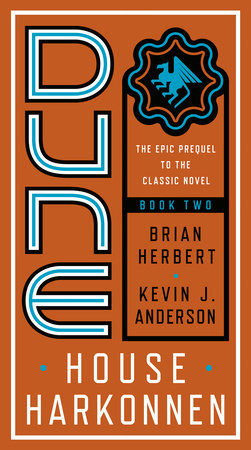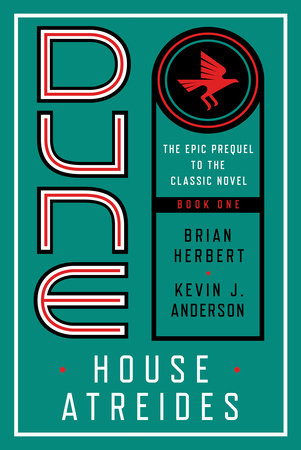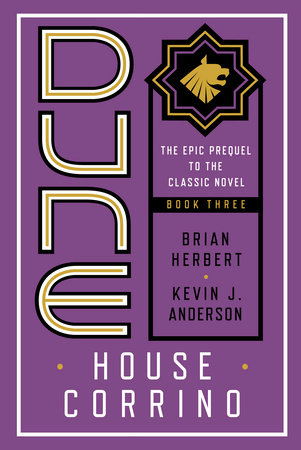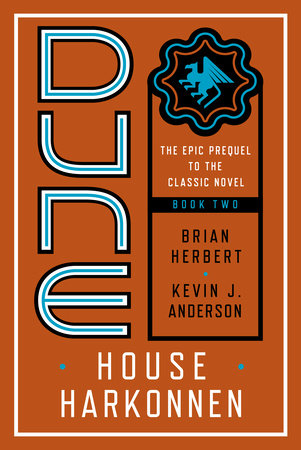Excerpt
Dune: House Harkonnen
When the sandstorm came howling up from south, Pardot Kynes was more interested in taking meteorological readings than in seeking safety. His son Liet — only twelve years old, but raised in the harsh ways of the desert — ran an appraising eye over the ancient weather pod they had found in the abandoned botanical testing station. He was not confident the machine would function at all.
Then Liet gazed back across the sea of dunes toward the approaching tempest. “The wind of the demon in the open desert. Hulasikali Wala.”
“Coriolis storm,” Kynes corrected, using a scientific term instead of the Fremen one his son had selected. “Winds across the open flatlands are amplified by the planet’s revolutionary motion. Gusts can reach speeds up to seven hundred kilometers per hour.”
As his father talked, the young man busied himself sealing the egg-shaped weather pod, checking the vent closures, the heavy doorway hatch, the stored emergency supplies. He ignored their signal generator and distress beacon; the static from the sandstorm would rip any transmissions to electromagnetic shreds.
In pampered societies Liet would have been considered a boy, but life among the hard-edged Fremen had given him a tightly coiled adulthood that few others achieved even at twice his age. He was better equipped to handle an emergency than his father.
The elder Kynes scratched his sandy-gray beard. “A good storm like this can stretch across four degrees of latitude.” He powered up the dim screens of the pod’s analytical devices. “It lifts particles to an altitude of two thousand meters and suspends them in the atmosphere, so that long after the storm passes, dust continues to fall from the sky.”
Liet gave the hatch lock a final tug, satisfied that it would hold against the storm. “The Fremen call that El-Sayal, the ‘rain of sand.’”
“One day when you become Planetologist, you’ll need to use more technical language,” Pardot Kynes said in a professorial tone. “We still send the Emperor occasional reports, though not as often as I should. I doubt he ever reads them.” He tapped one of the instruments. “Ah, I believe the atmospheric front is almost upon us.”
Liet removed a porthole cover to see the oncoming wall of white, tan, and static. “A Planetologist must use his eyes, as well as scientific language. Just look out the window, Father.”
Kynes grinned at his son. “It’s time to raise the pod.” Operating long-dormant controls, he managed to get the dual bank of suspensor engines functioning. The pod tugged against gravity, heaving itself off the ground.
The mouth of the storm lunged toward them, and Liet closed the cover plate, hoping the ancient meteorological apparatus would hold together. He trusted his father’s intuition to a certain extent, but not his practicality.
The egg-shaped pod rose smoothly on suspensors, buffeted by precursor breezes. “Ah, there we are,” Kynes said. “Now our work begins — ”
The storm hit them like a blunt club, and vaulted them high into the maelstrom.
The pod’s ancient suspensors hummed against the Coriolis howl like a nest of angry wasps. The meteorological vessel bounced on swirling currents of air, a steel-walled balloon. Wind-borne dust scoured the hull.
“This reminds me of the aurora storms I saw on Salusa Secundus,” Kynes mused. “Amazing things — very colorful and very dangerous. The hammer-wind can come up from out of nowhere and crush you flat. You wouldn’t want to be caught outside.”
“I don’t want to be outside in this one, either,” Liet said.
Stressed inward, one of the side plates buckled; air stole through the breach with a thin shriek. Liet lurched across the deck toward the leak. He’d kept the repair kit and foam sealant close at hand, certain the decrepit pod would rupture. “We are held in the hand of God, and could be crushed at any moment.”
“That’s what your mother would say,” the Planetologist said without looking up from the skeins of information pouring through the recording apparatus into an old datapack. “Look, a gust clocked at eight hundred kilometers per hour!” His voice carried no fear, only excitement. “What a monster storm!”
Liet looked up from the stone-hard sealant he had slathered over the thin crack. The squealing sound of leaking air faded, replaced by a muffled hurricane din.
“If we were outside, this wind would scour the flesh off our bones.”
Kynes pursed his lips. “Quite likely true, but you must learn to express yourself objectively and quantitatively. ‘Scour the flesh off our bones’ is not a phrasing one would include in a report to the Emperor.”
The battering wind, the scraping sand, and the roar of the storm reached a crescendo; then, with a burst of pressure inside the survey pod, it all broke into a bubble of silence. Liet blinked, swallowing hard to clear his ears and throat. Intense quiet throbbed in his skull. Through the hull of the creaking vessel, he could still hear Coriolis winds like whispered voices in a nightmare.
“We’re in the eye.” Glowing with delight, Pardot Kynes stepped away from his instruments. “A sietch at the center of the storm, a refuge where you would least expect it.”
Blue static discharges crackled around them, sand and dust rubbing together to generate electromagnetic fields. “I would prefer to be back in the sietch right now,” Liet admitted.
The meteorological pod drifted along in the eye, safe and silent after the intense battering of the storm wall. Confined together in the small vessel, the two had a chance to talk, as father and son.
But they didn’t....
Ten minutes later they struck the opposite sandstorm wall, thrown back into the insane flow with a glancing blow of the dust-thick winds. Liet stumbled and held on; his father managed to maintain his footing. The vessel’s hull vibrated and rattled.
Kynes looked at his controls, at the floor, and then at his son. “I’m not sure what to do about this. The suspensors are” — with a lurch, they began to plunge, as if their safety rope had been severed — “failing.”
Liet held himself against an eerie weightlessness as the crippled pod dropped toward the ground, which lay obscured by dusty murk. As they tumbled in the air, the Planetologist continued to work the controls.
The haphazard suspensors sputtered and caught again just before impact. The force from the Holtzman field generator cushioned them enough to absorb the worst of the crash. Then the storm pod slammed into the churned sand, and the Coriolis winds roared overhead like a spice harvester trampling a kangaroo mouse under its treads. A deluge of dust poured down, released from the sky.
Bruised but otherwise unharmed, Pardot and Liet Kynes picked themselves up and stared at each other in the afterglow of adrenaline. The storm headed up and over them, leaving the pod behind....
After working a sandsnork out through the clogged vent opening, Liet pumped fresh air into the stale confinement. When he pried open the heavy hatch, a stream of sand fell into the interior, but Liet used a static-foam binder to pack the walls. Using a scoop from his fremkit as well as his bare hands, Liet set to work digging them out.
Pardot Kynes had complete confidence in his son’s abilities to rescue them, so he worked in dimness to collate his new weather readings into a single old-style datapack.
Blinking as he pushed himself into the open air like an infant emerging from a womb, Liet stared at the storm-scoured landscape. The desert landscape was reborn: Dunes moved along like a marching herd; familiar landmarks changed; footprints, tents, even small villages erased. The entire basin looked fresh and clean and new.
Covered with pale dust, he scrambled up to more stable sand, where he saw the depression that hid the buried pod. When they’d crashed, the vessel had slammed a crater into the wind-stirred desert surface, just before the passing storm dumped a blanket of sand on top of them.
With Fremen instincts and an inborn sense of direction, Liet was able to determine their approximate position, not far from the South False Wall. He recognized the rock forms, the cliff bands, the peaks and rilles. If the winds had blown them a kilometer farther, the pod would have crashed into the blistering mountains, an ignominious end for the great Planetologist, whom the Fremen revered as their Umma, their prophet.
Liet called down into the hole that marked the buried vessel. “Father, I believe there’s a sietch in the nearby cliffs. If we go there, the Fremen can help us dig out the pod.”
“Good idea,” Kynes answered, his voice muffled. “Go check to make sure. I’ll stay here and work. I’ve ... got an idea.”
With a sigh, the young man walked across the sand toward the jutting elbows of ocher rock. His steps were without rhythm, so as not to attract one of the great worms: step, drag, pause ... drag, pause, step-step ... drag, step, pause, step....
Liet’s comrades at Red Wall Sietch, especially his blood brother Warrick, envied him for all the time he spent with the Planetologist. Umma Kynes had brought a vision of paradise to the desert people — they believed his dream of reawakening Dune, and followed the man.
Without the knowledge of the Harkonnen overlords — who were only on Arrakis to mine the spice, and viewed people only as a resource to be squeezed — Kynes oversaw armies of secret, devoted workers who planted grasses to anchor the mobile dunes; they established groves of cacti and hardy scrub bushes in sheltered canyons, watered by dew-precipitators. In the unexplored south polar regions, Fremen had planted palmaries, which had gained a foothold and now flourished. He had built a lush demonstration project at Plaster Basin that produced flowers, fresh fruit, and dwarf trees.
But though the Planetologist could orchestrate grandiose, world-spanning plans, Liet did not trust his father’s common sense enough to leave him alone for long.
The young man went along the ridge until he found subtle blaze marks on the rocks, a jumbled path no outsider would notice, messages in the placement of off-colored stones that promised food and shelter, under the respected al’amyah Travelers’ Benediction rules.
With the aid of strong Fremen in the sietch, they could excavate the weather pod and drag it to a hiding place where it would be salvaged or repaired; within an hour, the Fremen would remove all traces and let the desert fall back into brooding silence.
But when he looked back at the crash site, Liet was alarmed to see the battered vessel moving and lurching, already protruding a third of the way out of the sand. With a deep-throated hum, the pod heaved and strained, like a beast of burden caught in a Bela Tegeusan quagmire. But the pulsing suspensors had only enough strength to wrench the vessel upward a few centimeters at a time.
Liet froze when he realized what his father was doing. Suspensors. Out in the open desert!
He ran, tripping and stumbling, an avalanche of powder sand following his footsteps. “Father, stop. Turn them off!” He shouted so loudly that his throat grew raw. With dread in the pit of his stomach, he gazed across the golden ocean of dunes, toward the hellish pit of the faraway Cielago Depression. He scanned for a telltale ripple, the disturbance indicating deep movement....
“Father, come out of there.” He skidded to a stop in front of the open hatch as the pod continued to shift back and forth, straining. The suspensor fields thrummed. Grabbing the edge of the doorframe, Liet swung himself through the hatch and dropped inside the weather pod, startling Kynes.
The Planetologist grinned at his son. “It’s some sort of automated system — I don’t know what controls I bumped into, but this pod just might lift itself out in less than an hour.” He turned back to his instruments. “It gave me time to collate all our new data into a single storage — ”
Liet grabbed his father by the shoulder and pulled him from the controls. He slammed his hands down on the emergency cutoff switch, and the suspensors faded.
Confused, Kynes tried to protest, but his son urged him toward the open hatch.
“Get out, now! Run as fast as you can toward the rocks.”
“But — ”
Liet’s nostrils flared in angry exasperation. “Suspensors operate on a Holtzman field, just like shields. You know what happens when you activate a personal shield out in the open sand?”
“The suspensors are working again?” Kynes blinked, then his eyes lit up as he understood. “Ah! A worm comes.”
“A worm always comes. Now run!”
The elder Kynes staggered out of the hatch and dropped to the sand. He recovered his balance and oriented himself in the glaring sun. Seeing the cliff line Liet had indicated, a kilometer away, he trudged off in a jerky, mismatched walk, stepping, sliding, pausing, hopping forward in a complicated dance. The young Fremen dropped out of the hatch and followed along, as they made their way toward the safety of rocks.
Before long, they heard a hissing, rolling sound from behind. Liet glanced over his shoulder, then pushed his father over a dune crest. “Faster. I don’t know how much time we’ll have.” They increased their pace. Pardot stumbled, got back up.
Ripples arrowed across the sands directly toward the half-buried pod. Toward them. Dunes lurched, rolled, then flattened with the inexorable tunneling of a deep worm rising to the surface.
“Run with your very soul!” They sprinted toward the cliffs, crossed a dune crest, slid down, then surged forward again, the soft sand pulling at their feet. Liet’s spirits rose when he saw the safety of rocks less than a hundred meters away.
The hissing grew louder as the giant worm picked up speed. The ground beneath their boots trembled.
Finally, Kynes reached the first boulders and clutched them like an anchor, panting and wheezing. Liet pushed him farther, though, onto the slopes, to be sure the monster could not rise from the sand and strike them.
Minutes later, sitting on a ledge, wordless as they sucked hot air through their nostrils to catch their breath, Pardot Kynes and his son stared back to watch a churning whirlpool form around the half-buried weather pod. In the loosening powder, as the viscosity of the stirred sand changed, the pod shifted and began to sink.
The heart of the whirlpool rose up in a cavernous scooped mouth. The desert monster swallowed the offending vessel along with tons of sand, forcing all the debris down into a gullet lined with crystal teeth. The worm sank back into the arid depths, then Liet watched the ripples of its passage, slower now, returning into the empty basin....
In the pounding silence that followed, Pardot Kynes did not look exhilarated from his near brush with death. Instead, he appeared dejected. “We lost all that data.” The Planetologist heaved a deep breath. “I could have used our readings to understand those storms better.”
Liet reached inside a front pocket of his stillsuit and held up the old-style datapack he had snatched from the pod’s instrument panel. “Even while watching out for our lives — I can still pay attention to research.”
Kynes beamed with fatherly pride.
Under the desert sun, they hiked up the rugged path to the safety of the sietch.







